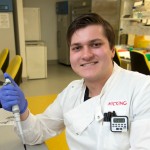
Declan Siedler
Medical Researcher
Wicking Dementia Research and Education Centre
I’ve always been fascinated by the brain. How this structure within our heads, which has the consistency of a blob of jelly, controls our most complex actions, thoughts and emotions, continues to amaze me. However, there is so much that we still don’t know about how the brain works. A neuroscientist is someone who endeavours to uncover the secrets of this modern day enigma. Although there are many different areas within neuroscience, the field I am most interested in involves how the brain responds to injury on a microscopic level. To do this, I use special chemicals that bind to the damaged areas, which will light up when I look at them under a microscope.
I always wanted to have a career where I had a role in helping people, yet I wanted to combine this with my passion for health sciences and understanding how changes on a cellular or molecular level manifest as symptoms and disease. To do this, I undertook a Bachelor of Medicine/Bachelor of Surgery at the University of Tasmania. However, while listening to lecturers who are very passionate about neuroscience, I realised that I also wanted to have a more active role in understanding how to develop new ways of treating disease. This motivated me to undertake an Honours project with the Wicking Dementia Research and Education Centre.
My project involves looking at how certain structures within the communication tracks of nerve cells, known as axons, respond when they are injured and how this impacts on long-term functional outcomes. I hope to one day operate as a clinician scientist, where I treat patients in a hospital setting, yet also have a focus on developing and trialling new therapeutic strategies.
A career in science is exciting and filled with suspense because irrespective of the field, research delves into the realm of the unknown. Albert Einstein once said, “I have no special talent. I am only passionately curious”. Curiosity is one of the most important traits when exploring the unknown. Science is exciting because it gives you the opportunity to uncover new knowledge rather than just read what’s already been discovered from a textbook. For those contemplating a career in science, my advice would be to pick a field that excites you, and to not be afraid in exploring the endless possibilities. From there, it is just a matter of using that “blob of jelly” within your head to get curious!
For more information: https://www.utas.edu.au/wicking